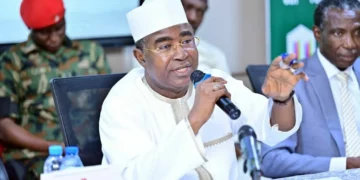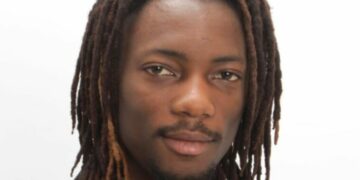Year 2023, just like other odd years in Nigeria’s election calendar, signals the climax and anticlimax of the politics season of the last four years.
What’s more, 2023 is a year of transitional elections both at the national level and in most states, no thanks to the introduction of staggered sub-national elections in 2003.
Like 2007 and 2015, this year’s election was intense because the presidency of Muhammadu Buhari had come to an end after his two terms of eight years as provided by the law.
With presidential primaries of the political parties conducted the previous year and campaigns in full blast, all eyes were mainly on the candidates of the ruling All Progressives Congress (APC), Bola Tinubu; Peoples Democratic Party (PDP), Atiku Abubakar.
The Labour Party candidate, Peter Obi, who had broken out of the PDP, was still viewed with cautious optimism or was waved as not being able to win beyond a few states in the geopolitical south.
He was running a campaign driven by the Obidient movement, comprising young mobile Nigerians and elder statesmen who refused to support either of the two other candidates.
Obi was however not the only one to pull away from the PDP. A group of five PDP governors led by Nyesom Wike withheld support for the presidential candidate of their party in what appeared to be the blow to the party’s chances of success at the polls.
READ ALSO: Give Nigerians Reasons To Smile In 2024, Archbishop Tells Govt
Nevertheless, the campaign was intense, ranging from the same-faith ticket of the APC, to corruption allegations against the PDP candidate.
The real surprise however, maybe the rift that the Tinubu candidacy caused within the southwest and its quest for political relevance. The wounds opened by the Muslim-Muslim are yet to fully heal as the General Overseer of the Redeemed Christian Church of God, Pastor Enoch Adeboye is yet to fully embrace the Tinubu presidency. Both he and former Vice President, Yemi Osinbajo, who was widely assumed to be his preferred candidate to yet to seen publicly visiting the presidential villa since the new administration came to power.
Senator Ayodele Arise who represents the Peoples Democratic Party (PDP) in Ekiti State said there are bound to be cracks, separation and disengagements after a major election, saying he expects the political gladiators to put national interest above personal interests.
Senator Ayo Arise said, ‘’The president should forget the difference between him and the former Vice President Professor Yemi Osinbajo (SAN) . What he should concern himself with is the future.
‘’Mind you, he and Osinbajo had come a long way. Osinbajo was thecommissioner for Justice and Attorney General when Tinubu was governor of Lagos State. The fact that Osinbajo contested the presidential primary along with him should not bring disengagement between the two.
‘’There was this impression that some of those who contested the presidential primary with Tinubu in 2022 were sponsored by some groups or the other, what matters most is to fix the country Nigeria, so every group should be ready to shelve their differences and move the nation forward.
‘’What matters in 2027 is to move the nation forward and that should be the concern of everybody.
Another Yoruba elder, Kehinde Fagbolade said the cracks in their fold created by politics, elections are gradually being mended, saying the major one he is aware of is the running battle between Chief Bode George and President Bola Tinubu saying some elders had since called a peace parley to resolve the issue.
He said, ‘’I remember one of the request made by the All Progressives Congress leaders was that Chief George cease further fire against Tinubu and the Peoples Democratic Party leader said he has nothing personal against the President. Since that time, I have not heard any negative comments from Chief George.’’
The Presidential Election
On D-day, February 25, the presidential election was held as scheduled by the Independent National Electoral Commission (INEC).
While violence was recorded in some states, there were also logistics challenges by INEC. However, concerns surrounding the conduct of the election were heightened when real time uploading of results from the polling units to the results viewing portal (IReV) as promised by INEC failed.
The IReV portal was part of the technologies introduced by the commission to improve the transparency of the electoral process.
The portal’s inactivity for a long time raised concerns from civil society and observer groups. Interestingly, while results for the presidential election were not uploaded, those of federal legislative elections, Senate and House of Representatives, which were held the same day were easily uploaded.
The opposition became agitated and called for a review of the electoral process. INEC rejected the opposition’s call.
The commission eventually declared APC’s Tinubu winner of the election with 8,794,726 votes, 36.61%.
According to the commission, PDP’s Atiku came second with 6,984,520 votes, 29.07% while LP’s Obi Peter came third with 6,101,533 votes, 25.40%.
Post election Tribunal
With the election over, the legal battle began at the Presidential Election Petition Court, and then the Appeal Court, and finally the Supreme Court which upheld Tinubu’s victory at the polls as done by the two lower courts.
Subnational Elections
Governorship elections were held for state governors in 31 out of 36 Nigerian states on March 18. The APC and PDP picked up two governorships each in the March elections, with the APC winning Benue and Sokoto while the PDP gained Plateau and Zamfara. Additionally, both the LP and NNPP gained one governorship with the LP gaining Abia and the NNPP flipping Kano. Two gubernatorial races—Adamawa and Kebbi—were initially declared inconclusive due to close margins and results cancellations. But were later concluded with PDP and APC winning in Adamawa and Kebbi respectively.
Meanwhile, verdicts from the ongoing post-election tribunal has caused upsets in states like Kano, Zamfara, Plateau, where the victory of governors as declared by INEC are shaky.
Battle for National Assembly leadership
Meanwhile as the legal battle raged after the elections, so did the battle for the National Assembly leadership. Senator Godwill Akpabio from Akwa Ibom State contested against Senator Abdulaziz Yari from Zamfara. They were both former governors. In the House of Representatives, Hon Tajudeen Abass squared up against a team of other lawmakers.
After intense lobbying and campaigning among colleagues, Akpabio and Abass, considered candidates of the presidency, won their elections to emerge Senate President and Speaker of the House.
Akpabio polled 63 votes to defeat Yari, who scored 46 votes, while Abass scored 353 votes out of 359 to defeat fellow contenders, Ahmed Wase and Sani Jaji, who polled three votes each.
Ministerial appointment
After his swearing in on May 29, President Tinubu submitted his first ministerial nominee list to the Senate in July. The list has 28 nominees which had seven women. In August, he submitted a supplementary ministerial list.
However, the immediate past governor of Kaduna State, Nasir el-Rufai was dropped out of the president’s ministerial list following a petition against his nomination. He wasn’t as lucky as other immediate past governors like Dave Umahi, Nyesom Wike, Mohammed Badaru, Bello Matawalle, Gboyega Oyetola, Simon Lalong who made the final list.
Although the screening process by the Senate was considered uninspiring, President Tinubu, later in August, inaugurated his cabinet comprising 45 members.
Imo, Kogi, Bayelsa Polls
The first round of off-season elections was held on November 11 in Kogi, Imo and Bayelsa. After the intense campaigns and elections fraught with violence and malpractices, APC’s Hope Uzodimma won in Imo, PDP’s Senator Douye Diri won in Bayelsa, and APC’s Usman Ododo won in Kogi. While Uzodimma and Diri won to serve a second term, Ododo won to begin his first term.
Wike, Fubara Tussle in Rivers State
In what has become the quickest falling out between a political godfather and godson, the raging face off between FCT minister Nyesom Wike and his immediate successor, Governor Siminalayi Fubara, has captured the imagination of political observers.
The rift between Wike and Fubara came to light in October barely six months after the latter took over as governor from the former, who single handedly ensured his successor was successful at the March 18 polls in the state.
However, in October, the friction between Wike and Fubara came to light when moves to impeach the governor by Wike’s loyalists in the State House of Assembly failed. From there on, the political tussle has intensified, defying interventions by President Tinubu and other elder statesmen including, Niger Delta leader, Chief Edwin Clark and a former governor of the state,
Chief Rufus Ada-George.
So far, 26 state lawmakers have defected to APC from PDP, amid declaration that their seats are vacant. Also six commissioners have resigned from the governor’s cabinet. Meanwhile the four lawmakers on the side of the governor have passed a budget he sent to them earlier this week.
The battle which is the first falling out between a former governor and an incumbent he supported to occupy the office, is still unfolding.





